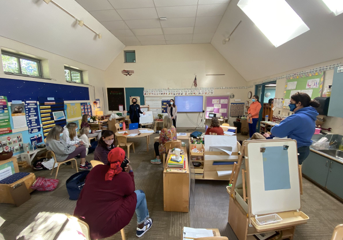Facilitating Play, Assessing Learning, and Planning for Future Instruction
December 16, 2021

Through play, students learn crucial skills for future success, including self-regulation and executive functioning. During play, students are required to make choices, focus, and problem-solve. Our students’ work is their play. Through purposeful play, facilitated by experienced and supportive teachers, children learn their names, letters, and numbers as a result of authentic learning opportunities. Students need many experiences to “play well” as they move through the different stages of solitary, parallel, associative, and collaborative play.
We assess student learning and plan for further instruction within the framework of a play-based education. Often, standardized assessments are not always the best indicator of what a child can do or what they know in early childhood. The Early Learning Center (ELC) faculty work within their teams to rethink and reshape what assessment looks like within play-based learning for young children. What we all agree upon is that authentic assessments provides us with a better picture of what young children know and what they can do.
Teachers identify learning outcomes for their grade level and then decide what learning experiences they needed to create for their students to meet those goals. They consider different adaptations to the classroom environment, extensions, and supports to help students achieve these goals.
Teachers take on different roles in response to the moment and the student. Some of these roles include questioner, researcher, facilitator, listener, and provoker. The interactions between teachers and students are a crucial aspect of children’s development. ELC teachers are intentional and thoughtful about how they engage with your children, constantly asking themselves, “What role do I need to play in this moment?” It is an important dance to take on the various roles and an honor to respect and honor our students’ individual needs in this way.
Being a play-based teacher also means moving along a continuum of facilitating student-directed learning. Some moments call for acknowledging students’ choices, while others require scaffolding students’ learning and co-constructing knowledge with them, and then other moments need demonstration and direct instruction.
It would be easier to give out a pencil and worksheet to every student. But at Renbrook’s ELC our commitment is to support growth and development while maintaining a child-directed, play-based program. This requires deliberate planning and consistent documentation, enabling us to communicate with clarity what we do!
Posted in Academics